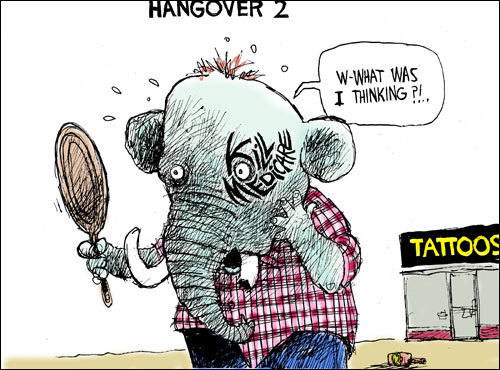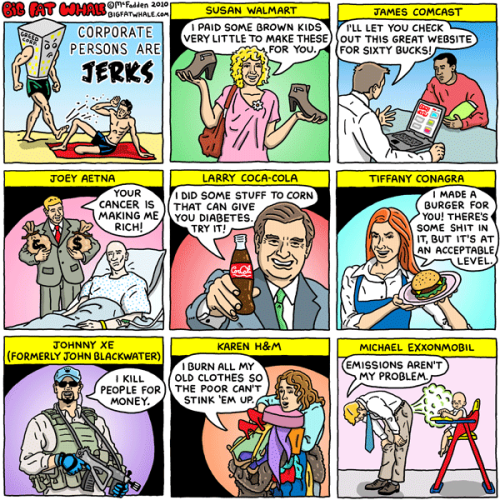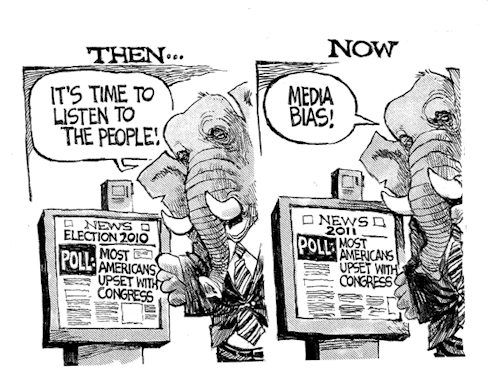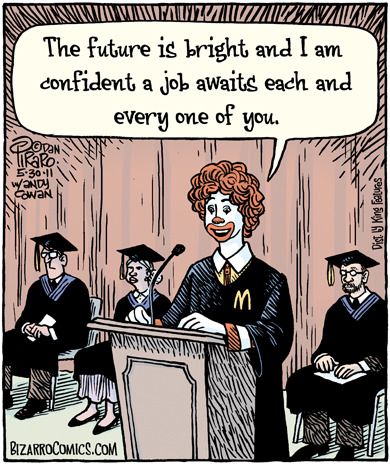
Agoraphobe with severe depression and chronic pain observes the world around him and finds it far more crazier than he.
31 May 2011
Former Black NFL Player Pulled Over For Looking Like Someone ‘Transporting Drugs And Guns’ | ThinkProgress
So it was to Dunn’s surprise when he was stopped by police officers for having “the characteristic of people transporting drugs and guns” last Friday. Dunn, who is a 36 year-old black man, was also stopped for having tinted windows that were allegedly “too dark.” Dunn reported the incident on his Facebook account late last week:
Pulled over outside Atl because he said my window tint was too dark. During the stop he asked a lot of personal questions, said I had the characteristics of people transporting drugs & guns. So he searched my car and gave me a warning for my tint. Felt violated and I’ve had my car since ’08, nvr been pulled ovr for tint. Taken back bc I think the reasoning was bad. Ruined my day but not my spirit.
Despite the alleged rationale of illegally tinted windows, Dunn wrote that “my tint is not dark.” In addition, “it was cloudy and [the police were] 20 yards behind at an angle.”
Dunn was not charged in the stop, but did ultimately receive a warning from the officers.
The former NFL player’s ordeal is one that is already felt by many across the nation. Yet if conservatives had their way, profiling incidents like Dunn’s would not just become more commonplace, but would be legally justified as well. Indeed, racial and ethnic profiling is widely supported by Republicans. Last year, Rep. Steve King (R-IA) called profiling “common sense” and Sen. James Inhofe (R-OK) justified it on the grounds that “all terrorists are Muslims or Middle Easterners.”
But the GOP’s push to profile necessarily stems from the idea that such “common sense” is not actually racist. To Republicans like former New Mexico Gov. Gary Johnson, racism no longer exists. To him, America is inherently “colorblind” and “not a discriminate [sic] nation” because, after all, “we elected a black president.” In fact, a recent study reveals that white Americans actually view “anti-white prejudice” as the predominant race problem of the times, as opposed to “anti-black bias.” With this as the dominant view, the racism Dunn endured is too often perceived by many Americans as belonging to an era long gone and existing only in the margins of today’s society — no matter how prevalent.
Ever gracious, Dunn told TMZ after the incident, “As the son of a hard working police officer, I understand the stress that police officers are under.” “The real lesson in all this is that Twitter is a powerful tool but what happened to me is the same thing that happens to a lot of people every day,” he added.
How Goldman Sachs Made Libya's $1 Billion Investment Disappear - Global - The Atlantic Wire
Last week we learned that Libyan leader Muammar Qaddafi (above, on left) had, in recent years, invested billions of dollars in oil revenues in several Western institutions, including Goldman Sachs. Today we're finding out exactly what Goldman bankers did with all that money. They lost it.
In early 2008, according to interviews and an internal document review conducted by The Wall Street Journal, Libya's sovereign wealth fund invested $1.3 billion in stock and currency options with Goldman, only to watch as the investments shrunk to a measly $25.1 million--that's two percent of the initial value, for those keeping score--as the credit crisis hit. A Libyan official was so furious with the bank during one meeting in Tripoli that Goldman officials hired a security guard to protect them before they left Libya, consulted Goldman chief Lloyd Blankfein (above, on right) about how to mend the relationship, and offered Libya the opportunity to become one of Goldman's biggest shareholders by investing $3.7 billion in preferred shares or corporate debt. The negotiations eventually collapsed, the Journal adds, but the episode is emblematic of a period of several years when Goldman and other Western banks rushed to do business with Libya after the U.S. decided to lift its sanctions against the country in 2004. That period, of course, is now history.
Washington moves to classify cyber-attacks as acts of war | World news | The Guardian
The US government is rewriting its military rule book to make cyber-attacks a possible act of war, giving commanders the option of launching retaliatory military strikes against hackers backed by hostile foreign powers.
The Pentagon has concluded that the laws of armed conflict can be widened to embrace cyberwarfare, in order to allow the US to respond with the use of force against aggressive assaults on its computer and IT infrastructure.
The move, to be unveiled in a US department of defence strategy document next month, is a significant step towards the militarisation of cyberspace, with huge implications for international law.
Pentagon officials disclosed the decision to the Wall Street Journal, saying it was designed to send a warning to any hacker threatening US security by attacking its nuclear reactors, pipelines or public networks such as mass transport systems. "If you shut down our power grid, maybe we will put a missile down one of your smokestacks," an official said.
The new strategy would adapt the existing right of self-defence contained in the UN charter by bringing cyberweapons under the definition of armed attacks.
Joel Reidenberg, a professor at Fordham University in New York who teaches on IT law, said the policy was an important recognition that new forms of warfare can harm Americans, "and that the US will protect its citizens in their 21st-century activities."
Sami Saydjari, a former Pentagon cyber expert who now runs a consultancy called Cyber Defense Agency, said the rule change was a logical and reasonable next step. "The US is vulnerable to sabotage in defence, power, telecommunications, banking. An attack on any one of those essential infrastructures could be as damaging as any kinetic attack on US soil."But other cyber specialists warned the new provision would be extremely hard to implement and could escalate the militarisation of the internet.
Jody Westby, co-author of the UN publication The Quest for Cyber Peace, said attacks are difficult to track and trace back to their origins, often making it impossible to determine who is behind them.
She also called for more diplomatic efforts to increase co-operation between governments rather than widening military options. "Sabre-rattling like this in the cyber age could backfire on the US, as it could spark further cyber-attacks on US infrastructure that could be massively destructive for American civilians."
The Obama administration signalled its intentions two weeks ago when the White House released its vision for the future of cyberspace. "When warranted, the US will respond to hostile acts in cyberspace as we would to any other threat to our country," it said, adding that such responses included "all necessary means" including military ones.
The US is considered especially prone to cyber-attacks because millions of computers in America have been infected and because its military networks are so highly computerised. Alan Paller, research director at the Sans Institute, which trains computer security professionals, said military and defence computers in the US have come under attack from foreign states at least since 2003, with losses including key technical data for the $300bn F35 fighter.
"The military knows its systems are under constant and increasingly sophisticated attacks," he said.
The threat was underlined at the weekend when arms manufacturer Lockheed Martin announced its computer systems had come under a "tenacious attack" on 21 May, though the company said it had thwarted the assault.
US analysts have their sights particularly on China and Russia as potential sources of state-sponsored cyberwarfare. A congressional panel has warned that China had the capability of hitting federal networks connected via the internet, such as the national electricity grid, in a way that "could paralyse the US".
Russia was blamed in 2008 for a computer attack on the US Central Command which oversees the wars in Afghanistan and Iraq. Russia was also implicated in more localised cyber attacks on Georgia and Estonia.
The US has also been implicated in cyber sabotage. It has been suggested that Stuxnet, the computer worm unleashed last year against Iran, was the work of the Israeli government, backed by Washington. Westby pointed out that the US has not denied the claim. "It seems we're happy to launch our own cyber-attacks when it suits us. That's hardly good diplomacy."
on Troy Davis
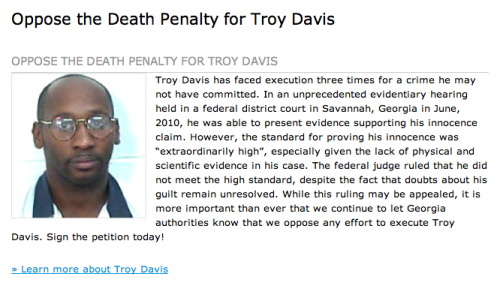 With so much rampant corruption in the American legal system at almost every level and in every state, there should be no executions lest we slaughter innocent people. Unfortunately, many of my fellow Americans are thirsty for blood and will have it, damn the consequences.
With so much rampant corruption in the American legal system at almost every level and in every state, there should be no executions lest we slaughter innocent people. Unfortunately, many of my fellow Americans are thirsty for blood and will have it, damn the consequences.
Compassionate conservatism?
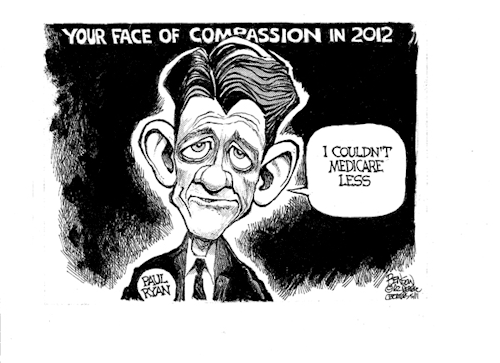 The reason for cutting Medicare and Social Security is plain. The US needs to pay for its endless, illegal wars and our rich folk are storing up their wealth for the coming end of the American empire/age (which is a direct result of our wars and oil addiction). The Republicans and, yes, the Democrats too, are in full bipartisan agreement on ending those programs because their incompetent leadership has led us to financial ruin. So die and die quickly ye old and infirm! We must bomb the shit out of foreign lands in the name of the almighty dollar!
The reason for cutting Medicare and Social Security is plain. The US needs to pay for its endless, illegal wars and our rich folk are storing up their wealth for the coming end of the American empire/age (which is a direct result of our wars and oil addiction). The Republicans and, yes, the Democrats too, are in full bipartisan agreement on ending those programs because their incompetent leadership has led us to financial ruin. So die and die quickly ye old and infirm! We must bomb the shit out of foreign lands in the name of the almighty dollar!
Cellphones may cause cancer, international agency says - NYPOST.com
LONDON — An international panel of experts says cellphones are possibly carcinogenic to humans after reviewing details from dozens of published studies.
The statement was issued in Lyon, France, on Tuesday by the International Agency for Research on Cancer after a weeklong meeting of experts. They reviewed possible links between cancer and the type of electromagnetic radiation found in cellphones, microwaves and radar.
The agency is the cancer arm of the World Health Organization and the assessment now goes to WHO and national health agencies for possible guidance on cellphone use.
The group classified cellphones in category 2B, meaning they are possibly carcinogenic to humans. Other substances in that category include the pesticide DDT and gasoline engine exhaust.
Last year, results of a large study found no clear link between cellphones and cancer. But some advocacy groups contend the study raised serious concerns because it showed a hint of a possible connection between very heavy phone use and glioma, a rare but often deadly form of brain tumor. However, the numbers in that subgroup weren't sufficient to make the case.
The study was controversial because it began with people who already had cancer and asked them to recall how often they used their cellphones more than a decade ago.
In about 30 other studies done in Europe, New Zealand and the U.S., patients with brain tumors have not reported using their cellphones more often than unaffected people.
Because cellphones are so popular, it may be impossible for experts to compare cellphone users who develop brain tumors with people who don't use the devices. According to a survey last year, the number of cellphone subscribers worldwide has hit 5 billion, or nearly three-quarters of the global population.
People's cellphone habits have also changed dramatically since the first studies began years ago and it's unclear if the results of previous research would still apply today.
Since many cancerous tumors take decades to develop, experts say it's impossible to conclude cellphones have no long-term health risks. The studies conducted so far haven't tracked people for longer than about a decade.
Cellphones send signals to nearby towers via radio frequency waves, a form of energy similar to FM radio waves and microwaves. But the radiation produced by cellphones cannot directly damage DNA and is different from stronger types of radiation like X-rays or ultraviolet light. At very high levels, radio frequency waves from cellphones can heat up body tissue, but that is not believed to damage human cells.
According to Cancer Research U.K., the only health danger firmly connected to cellphones is a higher risk of car accidents. The group recommends children under 16 only use cellphones for essential calls because their brains and nervous systems are still developing.
Also, a recent U.S. National Institutes of Health study found that cellphone use can speed up brain activity, but it is unknown whether that has any dangerous health effects.
NATO: Hits on Afghan houses to continue - NYPOST.com
BRUSSELS — A NATO spokeswoman says attacks on houses in Afghanistan are necessary and will continue in cooperation with Afghan security forces.
The comment came Tuesday after Afghan President Hamid Karzai said he would no longer allow NATO airstrikes on houses, following a recent strike that killed a group of children and women in southern Helmand province.
NATO spokeswoman Oana Lungescu says the alliance takes Karzai's concerns very seriously, and would continue to make every effort to avoid civilian casualties. She says all such strikes are coordinated with Afghan forces and "they continue to be necessary."
She says, "in many of these operations, Afghans are in the lead," she said. She would not comment specifically on the recent raid in Helmand province.
British military train Saudi security forces - mirror.co.uk
THE Government was under fire yesterday after it emerged UK troops have trained elite Saudi security forces.
Human rights groups were angered that soldiers helped train the country’s National Guard, sent into Bahrain to crush a popular uprising.
The disclosure comes amid criticism that the Government has not been as tough on the Bahraini and Syrian regimes as it was on Libya’s.
Nicholas Gilby, of the Campaign Against the Arms Trade, said training had allowed the Saudis “to develop tactics to help suppress the popular uprising”.
The Ministry of Defence claimed that teaching troops in other countries helped “save lives and raise awareness of human rights”.
Defence Secretary Liam Fox said: “Although elements in the National Guard have been used in Bahrain, there is absolutely no evidence that they’ve been used for anything other than protection of infrastructure.”
Supreme Court rules detained 'witness' cannot sue U.S. officials - CNN.com
(CNN) -- The Supreme Court ruled Tuesday that a lifelong U.S. citizen who was held in jail for 16 days as a "material witness" in an ongoing terror investigation cannot hold former Bush administration officials liable for wrongful arrest and detention.
Abdullah al-Kidd, a Kansas native, was never charged and was never called to testify. He wanted to hold former Attorney General John Ashcroft and others personally liable for wrongful arrest and detention.
The unanimous 8-0 ruling from the court is a victory for the government's efforts to detain those with potential links to terrorism. Al-Kidd's pending lawsuit was dismissed.
Material witness laws allow officials to detain those who may have knowledge of crimes committed by others to ensure they will testify in legal proceedings, including grand jury sessions and trials.
American Civil Liberties Union lawyers representing al-Kidd say the government has warped the law to allow open-ended arrests and confinement of citizens without anyone being later held accountable for those wrongfully held.
With their destruction of the 4th amendment the other week and this decision here, the Supreme Court has made it officially legal for the police or government to come and take you away forever just like they did in Soviet Russia and there's nothing you can do about it. We are the Soviets now and we make the Russians look like choir boys.
‘Malintent detection’ technology tested in the northeast United States | The Raw Story
The U.S. Department of Homeland Security (DHS) has begun field testing new technology designed to identify people who intend to commit a terrorist act.
Nature reported that the DHS has been conducting tests of Future Attribute Screening Technology (FAST) in the past few months at an undisclosed location in the northeast.
The technology uses remote sensors to measure physiological properties, such as heart rate and eye movement, which can be used to infer a person's current mindset.
According to a Privacy Impact Assessment (PDF) released by the DHS in 2008, the technology is intended to measure a person's malintent -- the intent to cause harm.
"Behavioral scientists hypothesize that someone with malintent may act strangely, show mannerisms out of the norm, or experience extreme physiological reactions based on the extent, time, and consequences of the event," the report stated. "The FAST technology design capitalizes on these indicators to identify individuals exhibiting characteristics associated with malintent."
The DHS has claimed accuracy rates of around 70 percent, but some scientists have questioned the results.
"Even having an iris scan or fingerprint read at immigration is enough to raise the heart rate of most legitimate travellers," Tom Ormerod, a psychologist in the Investigative Expertise Unit at Lancaster University, told Nature.
John Verrico, a spokesman for the DHS, said he could not comment on the performance of FAST because the results were still being analyzed and that additional tests would continue to be conducted.
So don't get nervous about job interviews or proposing marriage to your girl or if a cop car is trailing you because you might just get arrested for suspected terrorism America!
Obama Administration Opposes Private Suits Over Medicaid Cuts - NYTimes.com
By ROBERT PEAR
Published: May 28, 2011
WASHINGTON — Medicaid recipients and health care providers cannot sue state officials to challenge cuts in Medicaid payments, even if such cuts compromise access to health care for poor people, the Obama administration has told the Supreme Court.
States around the country, faced with severe budget problems, have been reducing Medicaid rates for doctors, dentists, hospitals, pharmacies, nursing homes and other providers.
Federal law says Medicaid rates must be “sufficient to enlist enough providers” so that Medicaid recipients have access to care to the same extent as the general population in an area.
In a friend-of-the court brief filed Thursday in the Supreme Court, the Justice Department said that no federal law allowed private individuals to sue states to enforce this standard.
Such lawsuits “would not be compatible” with the means of enforcement envisioned by Congress, which relies on the secretary of health and human services to make sure states comply, the administration said in the brief, by the acting solicitor general, Neal K. Katyal.
In many parts of the country, payment rates are so low that Medicaid recipients have difficulty finding doctors to take them.
But, the Justice Department said, the Medicaid law’s promise of equal access to care is “broad and nonspecific,” and federal health officials are better equipped than judges to balance that goal with other policy objectives, like holding down costs.
The administration expressed its views in a set of cases consolidated under the name Douglas v. Independent Living Center of Southern California, No. 09-958.
In 2008 and 2009, the California Legislature passed several laws reducing Medicaid payment rates. Recipients and providers challenged the cuts in court, arguing that the California plan violated — and was pre-empted by — the federal Medicaid statute.
The law does not explicitly allow such lawsuits. But the United States Court of Appeals for the Ninth Circuit, in San Francisco, said beneficiaries and providers could sue under the supremacy clause of the Constitution, which makes federal law “the supreme law of the land.” In reducing payment rates, the appeals court said, California violated the requirements of federal Medicaid law and threatened access to “much-needed medical care.”
California appealed to the Supreme Court, which is likely to hear oral arguments in the fall, with a decision by next spring.
Consumer advocates were dismayed by the administration’s position, which they said undermined Medicaid recipients’ rights and access to the courts.
“I find it appalling that the solicitor general in a Democratic administration would assert in a Supreme Court brief that businesses can challenge state regulation under the supremacy clause, but that poor recipients of Medicaid cannot challenge state violations of federal law,” said Prof. Timothy S. Jost, an expert on health law at Washington and Lee University, who is usually sympathetic to the administration.
Representative Henry A. Waxman of California, the senior Democrat on the Energy and Commerce Committee and an architect of Medicaid, said the administration’s brief was “wrong on the law and bad policy.”
“I am bitterly disappointed that President Obama would accept the position of the acting solicitor general to file a brief that is contrary to the decades-long practice of giving Medicaid beneficiaries and providers the ability to turn to the courts to enforce their rights under federal law,” Mr. Waxman said. He said that he and other Democratic lawmakers planned to file a brief opposing the administration’s view.
By contrast, many state officials agree with California and the Obama administration.
The National Governors Association and the National Conference of State Legislatures filed a friend-of-the-court brief endorsing California’s position that Medicaid recipients and providers could not sue.
In a separate friend-of-the-court brief, Michigan and 30 other states went further. “Allowing ‘supremacy clause lawsuits’ to enforce federal Medicaid laws will be a financial catastrophe for states,” they said.
Medicaid is financed jointly by the federal government and the states. The number of recipients and the costs increased sharply in the recent recession and will increase further with the expected addition of 16 million people to the rolls under the new federal health care law.
Republican president Barack Obama strikes again! I'm sorry I voted for him sometimes. But I guess to keep giving rich folk their unconscionable tax cuts and to fight perpetual wars for fun and profit, the poor in this nation should die and die quickly.
30 May 2011
The always-expanding bipartisan Surveillance State - Glenn Greenwald - Salon.com
When I wrote earlier this week about Jane Mayer's New Yorker article on the Obama administration's war on whistleblowers, the passage I hailed as "the single paragraph that best conveys the prime, enduring impact of the Obama presidency" included this observation from Yale Law Professor Jack Balkin: "We are witnessing the bipartisan normalization and legitimization of a national-surveillance state." There are three events -- all incredibly from the last 24 hours -- which not only prove how true that is, but vividly highlight how it functions and why it is so odious.
First, consider what Democrats and Republicans just jointly did with regard to the Patriot Act, the very naming of which once sent progressives into spasms of vocal protest and which long served as the symbolic shorthand for Bush/Cheney post-9/11 radicalism:
Top congressional leaders agreed Thursday to a four-year extension of the anti-terrorist Patriot Act, the controversial law passed after the Sept. 11 attacks that governs the search for terrorists on American soil.
The deal between Senate Majority Leader Harry Reid and House Speaker John Boehner calls for a vote before May 27, when parts of the current act expire. The idea is to pass the extension with as little debate as possible to avoid a protracted and familiar argument over the expanded power the law gives to the government. . . .
From its inception, the law's increased surveillance powers have been criticized by liberals and conservatives alike as infringements on free speech rights and protections against unwarranted searches and seizures.
Some Patriot Act opponents suggest that Osama bin Laden's demise earlier this month should prompt Congress to reconsider the law, written when the terrorist leader was at the peak of his power. But the act's supporters warn that al-Qaida splinter groups, scattered from Pakistan to the United States and beyond, may try to retaliate.
"Now more than ever, we need access to the crucial authorities in the Patriot Act," Attorney General Eric Holder told the Senate Judiciary Committee.
This will be the second time that the Democratic Congress -- with the support of President Obama (who once pretended to favor reforms) -- has extended the Patriot Act without any changes. And note the rationale for why it was done in secret bipartisan meetings: to ensure "as little debate as possible" and "to avoid a protracted and familiar argument over the expanded power the law gives to the government." Indeed, we wouldn't want to have any messy, unpleasant democratic debates over "the expanded power the law gives to the government." Here we find yet again the central myth of our political culture: that there is too little bipartisanship when the truth is there is little in Washington but that. And here we also find -- yet again -- that the killing of Osama bin Laden is being exploited to justify a continuation, rather than a reduction, in the powers of the National Security and Surveillance States.
Next we have a new proposal from the Obama White House to drastically expand the scope of "National Security Letters" -- the once-controversial and long-abused creation of the Patriot Act that allows the FBI to obtain private records about American citizens without the need for a subpoena or any court approval -- so that it now includes records of your Internet activities:
White House proposal would ease FBI access to records of Internet activity
The Obama administration is seeking to make it easier for the FBI to compel companies to turn over records of an individual's Internet activity without a court order if agents deem the information relevant to a terrorism or intelligence investigation.
The administration wants to add just four words -- "electronic communication transactional records" -- to a list of items that the law says the FBI may demand without a judge's approval. Government lawyers say this category of information includes the addresses to which an Internet user sends e-mail; the times and dates e-mail was sent and received; and possibly a user's browser history. . .
Stewart A. Baker, a former senior Bush administration Homeland Security official, said the proposed change would broaden the bureau's authority. "It'll be faster and easier to get the data," said Baker, who practices national security and surveillance law. "And for some Internet providers, it'll mean giving a lot more information to the FBI in response to an NSL." . . .
To critics, the move is another example of an administration retreating from campaign pledges to enhance civil liberties in relation to national security. The proposal is "incredibly bold, given the amount of electronic data the government is already getting," said Michelle Richardson, American Civil Liberties Union legislative counsel.
The critics say its effect would be to greatly expand the amount and type of personal data the government can obtain without a court order. "You're bringing a big category of data -- records reflecting who someone is communicating with in the digital world, Web browsing history and potentially location information -- outside of judicial review," said Michael Sussmann, a Justice Department lawyer under President Bill Clinton who now represents Internet and other firms.
So first they conspire with the GOP to extend the Patriot Act without any reforms, then seek to expand its most controversial and invasive provisions to obtain the Internet activities of American citizens without having to bother with a subpoena or judicial approval -- "they" being the Democratic White House.
Most critically, the government's increased ability to learn more and more about the private activities of its citizens is accompanied -- as always -- by an ever-increasing wall of secrecy it erects around its own actions. Thus, on the very same day that we have an extension of the Patriot Act and a proposal to increase the government's Internet snooping powers, we have this:
The Justice Department should publicly release its legal opinion that allows the FBI to obtain telephone records of international calls made from the U.S. without any formal legal process, a watchdog group asserts.
The nonprofit Electronic Frontier Foundation alleges in a lawsuit filed Thursday that the Justice Department's Office of Legal Counsel violated federal open-records laws by refusing to release the memo.
The suit was prompted in part by McClatchy's reporting that highlighted the existence of the memo and the department's refusal to release it. Earlier this year, McClatchy also requested a copy and was turned down.
The decision not to release the memo is noteworthy because the Obama administration -- in particular the Office of Legal Counsel -- has sought to portray itself as more open than the Bush administration was. By turning down the foundation's request for a copy, the department is ensuring that its legal arguments in support of the FBI's controversial and discredited efforts to obtain telephone records will be kept secret.
What's extraordinary about the Obama DOJ's refusal to release this document is that it does not reveal the eavesdropping activities of the Government but only its legal rationale for why it is ostensibly permitted to engage in those activities. The Bush DOJ's refusal to release its legal memos authorizing its surveillance and torture policies was unquestionably one of the acts that provoked the greatest outrage among Democratic lawyers and transparency advocates (see, for instance, Dawn Johnsen's scathing condemnation of the Bush administration for its refusal to release OLC legal reasoning: "reliance on 'secret law' threatens the effective functioning of American democracy" and "the withholding from Congress and the public of legal interpretations by the Justice Department Office of Legal Counsel (OLC) upsets the system of checks and balances between the executive and legislative branches of government."
The way a republic is supposed to function is that there is transparency for those who wield public power and privacy for private citizens. The National Security State has reversed that dynamic completely, so that the Government (comprised of the consortium of public agencies and their private-sector "partners") knows virtually everything about what citizens do, but citizens know virtually nothing about what they do (which is why WikiLeaks specifically and whistleblowers generally, as one of the very few remaining instruments for subverting that wall of secrecy, are so threatening to them). Fortified by always-growing secrecy weapons, everything they do is secret -- including even the "laws" they secretly invent to authorize their actions -- while everything you do is open to inspection, surveillance and monitoring.
This dynamic threatens to entrench irreversible, absolute power for reasons that aren't difficult to understand. Knowledge is power, as the cliché teaches. When powerful factions can gather unlimited information about citizens, they can threaten, punish, and ultimately deter any meaningful form of dissent: J. Edgar Hoover infamously sought to drive Martin Luther King, Jr. to suicide by threatening to reveal King's alleged adultery discovered by illicit surveillance; as I described earlier today in my post on New York's new Attorney General, Eliot Spitzer was destroyed in the middle of challenging Wall Street as the result of a massive federal surveillance scheme that uncovered his prostitution activities. It is the rare person indeed with nothing to hide, and allowing the National Security State faction unfettered, unregulated intrusive power into the private affairs of citizens -- as we have been inexorably doing -- is to vest them with truly awesome, unlimited power.
Conversely, allowing government officials to shield their own conduct from transparency and (with the radical Bush/Obama version of the "State Secrets privilege") even judicial review ensures that National Security State officials (public and private) can do whatever they want without any detection and (therefore) without limit or accountability. That is what the Surveillance State, at its core, is designed to achieve: the destruction of privacy for individual citizens and an impenetrable wall of secrecy for those with unlimited surveillance power. And as these three events just from the last 24 hours demonstrate, this system -- with fully bipartisan support --- is expanding more rapidly than ever.
UPDATE: I confused the timing of the second incident I mentioned here: the White House's proposal to expand NSL's to include Internet records. That actually occurred last July. But I also neglected to include in this list the Obama White House's September demands that all ISP's and manufacturers of electronic communication devices (such as Blackberries) provide "backdoors" for government surveillance, so that bolsters the points I made here.
29 May 2011
Man who gave trooper the finger has charge dropped - Yahoo! News
DENVER – A harassment charge has been dropped in the case of a 35-year-old Colorado man who faced prosecution for displaying his middle finger to a Colorado State Patrol trooper.
The State Patrol said in a statement late Friday that it asked that the case be dropped.
The American Civil Liberties Union had argued that while the gesture may be have been rude, it amounted to protected free speech.
According to the ACLU, Shane Boor was driving to work in April when he saw a trooper pull over a car. As Boor passed by, he extended his middle finger in the trooper's direction.
Boor was later stopped and received a criminal summons ordering him to appear in court to answer a criminal charge of harassment, which carries a possible six-month jail term.
Fukushima plant not ready for approaching typhoon | The Raw Story
Officials from the Tokyo Electric Power Company (TEPCO) are apologizing in advance for the fact that the stricken Fukushima nuclear plant is not ready for the high winds and heavy rain of Typhoon Songda, a massive storm that could make landfall in Japan as early as Monday.
The BBC quotes a TEPCO official as saying, "We have made utmost efforts, but we have not completed covering the damaged reactor buildings. We apologize for the lack of significant measures against wind and rain."
Buildings housing the plant's nuclear reactors are still standing open in the wake of crippling hydrogen explosions that followed Japan's March 11 earthquake and tsunami. The approaching storm could scatter highly radioactive materials into the air and sea. Plant operators are currently spreading "anti-scattering agents" around the buildings housing reactors one and four.
An adviser to Japan's Prime Minister Naoto Kan has criticized TEPCO officials, saying that the current safety measures "cannot be said to be appropriate". TEPCO and the Japanese government have faced condemnation of their handling of the crisis, which some see as inept and lacking in transparency.
It is unclear whether the Fukushima plant will be in the direct path of the typhoon.
28 May 2011
Joe Conason: From Wisconsin to Florida, Strong Winds of Political Remorse - Truthdig
By Joe Conason
Still spinning in the vortex of the May 24 tornado in New York’s 26th Congressional District, Republican leaders insist that Democrat Kathy Hochul’s upset victory on their party’s turf was meaningless. They say that Republican nominee Jane Corwin lost because of her own weak campaign, or the presence of a big-spending tea party candidate on a third ballot line, or just about anything except the Republican scheme to slash Medicare—which became the dominant topic of debate during the special election’s final weeks.
Yet there are signals not only from upstate New York but around the nation that the Republicans face surging discontent, as voters learn what they intend when they attain power. With a majority in the House of Representatives, they have devised a budget plan that would help nobody except the wealthiest taxpayers, while devastating the nation’s health insurance programs, physical infrastructure and environment.
With most of the nation’s statehouses under Republican control, they have inflicted harsh cutbacks in education, health care and public safety, while assailing every public employee, from teachers to firefighters and cops.
Evidently, the people do not approve of these assaults on the standard of living of the American middle class.
According to recent public opinion polls, in fact, the people feel a keen sense of “buyer’s remorse” for supporting the Republicans last November. From the Canadian border down to the Florida coast, swing-state voters are expressing deep regret over the results of the midterm elections.
In Wisconsin, the latest surveys show that substantial majorities now regret electing Gov. Scott Walker, who has earned national fame (or infamy) for rescinding the collective bargaining rights of his state’s public workers. Three months after the end of the mass protests against Walker’s actions, the nonpartisan Public Policy Polling firm found that 54 percent of his Wisconsin constituents disapprove of his performance, while only 43 percent approve. Asked whether they would support or oppose his removal from office in a recall election, 50 percent said yes and only 47 percent said no.The same poll found that Wisconsin voters are also apparently sorry that they replaced progressive Democratic Sen. Russ Feingold last fall with a tea party extremist named Ron Johnson. Today, they would re-elect Feingold with a comfortable margin over any Republican, and would bounce the Republican majority in the state Legislature, too.
As for Medicare, the publicity afforded Rep. Paul Ryan, the Wisconsin author of the Republican plan to transform the single-payer national health insurance into a stingy voucher, is rapidly losing popularity in his home state. A new PPP polls shows that Ryan’s approval rating has dropped precipitously over the past six months, with 46 percent now viewing him unfavorably and 41 percent viewing him favorably. Perhaps that is why he has decided not to run for the state’s open Senate seat.
Recent polls show the same kind of repentance over the midterm Republican sweep among voters in Florida and Ohio—except that the anger in those states seems even deeper.
A nonpartisan Quinnipiac College poll released on May 25 found that Florida voters now disapprove of Republican Gov. Rick Scott, a far-right ideologue whom they elected narrowly last fall, by a margin of 57 percent to 29 percent. Never popular, Scott began to plummet in polls as early as last March, when he commenced a series of attacks on the state’s teachers, and his proposals for deep cuts in education and health care (and in taxes on millionaires like himself) have sent the bald-domed insurance magnate into a free fall.
Meanwhile, Ohio voters likewise wish they could be rid of Gov. John Kasich, who has imitated Scott Walker’s assault on the public sector. Asked how they would vote if last November’s election were held today, the clear answer—by a remarkable margin of 25 points—is that they would keep Ted Strickland, the defeated Democratic incumbent, instead of replacing him with Kasich.
Such powerful signs of voter disillusionment portend serious trouble for the Republicans. And unlike the special election result in New York, those frightening numbers can indeed be blamed on the tea party, which has imposed an extremist ideology that most Americans reject.
If Democrats can at long last learn to explain how they differ from their right-wing adversaries—and if they stand fast in protecting the middle class—then the election of 2012 will be theirs to win.
Watchdogs Say Stephen Colbert's PAC Request Is No Joke, Urge FEC Not To Expand Media Exception | TPMMuckraker
Two good government groups are urging the Federal Elections Commission to reject Stephen Colbert's request for a "media exception" which would allow his employer Viacom to cover the costs of his "Super PAC" without having to disclose those expenses as in-kind contributions -- including the group headed by the lawyer representing Colbert.
Colbert's request could have serous implications on campaign finance law and would "would permit the corporate media employer of these individuals to make unlimited, undisclosed contributions to their PACs under the guise of the 'press exemption'," Campaign Legal Center and Democracy 21 said in a statement. They mentioned that Sarah Palin, Mike Huckabee, Newt Gingrich and Rick Santorum all had PACs and are (or recently were) television hosts or commentators.
"Although we recognize that Mr. Colbert submitted his advisory opinion in the spirit of political comedy, an opinion by the FEC permitting all that Mr. Colbert requests would have a sweeping and damaging impact on disclosure laws and the public's right to know about campaign finance activities," Paul S. Ryan, FEC Program Director at the Campaign Legal Center, said in a statement.
"Many television show hosts who are serious politicians have PACs that could reap great financial benefit from the expansion of the scope of the 'press exemption' to cover the costs of independent expenditure ads made for their federal PACs and the payment of such PACs' administrative expenses," Ryan said.
Democracy 21 President Fred Wertheimer said the press exemption "simply does not apply to allow a corporation like Viacom to secretly finance independent ads for Mr. Colbert's Super PAC, nor does it allow Viacom to secretly pay for the administrative costs of the Colbert Super PAC."
He said an advisory opinion from the FEC "would result in the Commission opening up a gaping loophole in the disclosure laws."
The Campaign Legal Center is headed by Trevor Potter, who is representing Colbert in his FEC request. Potter recused himself and took no part in the center's consideration of the Colbert filing.
Both groups say that the FEC's test for applying the so-called press exemption is determining whether an entity is acting in a "legitimate press function." Creating ads for "Colbert PAC," and paying the administrative costs of a PAC as Colbert wants to do with Viacom's money, "do not constitute legitimate press functions," the groups said.
Read their filing with the FEC here.
ThinkProgress » Rep. Walsh: Obama Was Only Elected Because He’s An ‘Articulate’ ‘Black Man’
 Asshole of the day Joe Walsh
In an interview this week with Slate’s Dave Weigel, Rep. Joe Walsh (R-IL) confirmed his reputation as a lightning rod for controversy and for being, as Weigel puts it, “the biggest media hound in the freshman class.” In the past week, Walsh has made a number of outrageous statements, most infamously his admonishment that American Jews “aren’t as pro-Israel as they should be.”
Asshole of the day Joe Walsh
In an interview this week with Slate’s Dave Weigel, Rep. Joe Walsh (R-IL) confirmed his reputation as a lightning rod for controversy and for being, as Weigel puts it, “the biggest media hound in the freshman class.” In the past week, Walsh has made a number of outrageous statements, most infamously his admonishment that American Jews “aren’t as pro-Israel as they should be.” But even that seems to pale in comparison to what Walsh tells Weigel — that Barack Obama would not have been elected president if he wasn’t black. Walsh dismisses Obama’s meteoric rise as essentially a form of affirmative action and a manifestation of “white guilt” in which the media was complicit:
“Why was he elected? Again, it comes back to who he was. He was black, he was historic. And there’s nothing racist about this. It is what it is. If he had been a dynamic, white, state senator elected to Congress he wouldn’t have gotten in the game this fast. This is what made him different. That, combined with the fact that your profession”—another friendly tap of the bumper sticker—”not you, but your profession, was just absolutely compliant. They made up their minds early that they were in love with him. They were in love with him because they thought he was a good liberal guy and they were in love with him because he pushed that magical button: a black man who was articulate, liberal, the whole white guilt, all of that.”
Weigel notes that in the six months since he took office, Walsh has made more TV appearances than any other freshman in the House. He’s become a favorite of cable bookers, who can count on him as “a handsome freshman who will say anything.” This latest outburst certainly won’t do anything to dispel that perception.
27 May 2011
TAKE ACTION: No Applause for Netanyahu | Jewish Voice for Peace
Dear Supporter,
I was stunned to see that our entire U.S. Congress gave Israeli Prime Minister Bibi Netanyahu 29 standing ovations on Tuesday. Twenty-nine. Unbelievable, given what his speech contained.
The speech that Netanyahu gave that day will go down in history as an extraordinary embarrassment to Americans and Israelis alike. Read on to find out what he said and why we cannot let it go unanswered.
To put it simply, Netanyahu proved yet again that he prefers settlement expansion and Jewish domination of Palestinians to any kind of true peace agreement that would benefit both peoples. He claimed that Israel isn’t occupying anyone—ignoring nearly 44 years of increasingly brutal Israeli control over the lives of millions of Palestinians.
He stated that Israel had no need for American military assistance—ignoring the $3 billion in military equipment and aid the U.S. provides Israel each year. He said Israel supports the desire of Arab peoples to live free—saying nothing about the ongoing Israeli shootings and arrests of Palestinians who nonviolently protest for their right to be free. (1)
What makes this so outrageous is that Netanyahu’s speech found a shockingly sympathetic audience in the U.S. Congress while people like you and me could only watch in disbelief.
I’ve had it. I cannot stand by and watch my member of Congress applaud this man and his litany of distortions, myths and outright fabrications. Please, I urge you to join me in writing your US Representative to say, “How could you? Israeli Prime Minister Netanyahu has shown repeatedly that he is not interested in a viable future for either Palestinians or Israelis and you rewarded him with 29 standing ovations as the world watched.
Here’s a taste of what Netanyahu said, and Jewish Voice for Peace’s debunking of it:
“You don’t need to send American troops to Israel, we defend ourselves.“
Not true. Israel does not defend itself. Israel is historically the number one recipient of US foreign aid. The US gives Israel a whopping $3 billion a year in aid and military equipment, most of which is used to defend Israel’s illegal occupation.
“In Judea and Samaria, the Jewish people are not occupiers.” (Raucous standing ovation.)
Not True. Israel’s nearly 44-year long occupation of Palestinian territories is illegal according to international law. The more than 500,000 Jewish Israelis who have been moved into the West Bank and East Jerusalem since 1967 are settlers who occupy Palestinian land – much of it privately owned by Palestinians and stolen by Jews the rest of it expropriated by the Israeli state – all taken for exclusive Jewish use. (2) This is occupation.
Moreover, “Judea and Samaria” are the biblical terms for that piece of land. Is Bibi suggesting a state based not on secular law but on the Bible? A Jewish theocracy? Is this the Israel that our Congress promotes?
“You don’t need to export democracy to Israel. We’ve already got it.”
Not true. Within Israel, the 20% of Israeli citizens who are Palestinian do have the right to vote and run for office. But they are victims of systematic housing, workplace and resource discrimination. For example, 93% of Israeli land is reserved for Jews.(3) In the West Bank, more than 2 million Palestinians live under Israeli occupation—that is, their lives are ruled by Israeli military law, while their Jewish settler neighbors are subject to Israeli civil law. Another 1.5 million Gazans live under siege by the Israeli military. Is this democracy?
“Jerusalem must never again be divided. Jerusalem must remain the united capital of Israel.”
Not true. The original UN charter that created Israel, as still recognized by the international community, identified Jerusalem as an internationalized zone that must be shared by all parties.
I should say that I’m not really shocked by Netanyahu’s speech. But, I am shocked – shocked, stunned, discouraged, outraged – by the reaction of our elected officials. Clearly, they are not hearing from the growing number of people like you and me who are ready for a change. They won’t stop applauding until we speak up – and speak up loudly.
Rae Abileah is with the advocacy group Code Pink and a member of Young, Jewish, and Proud, the young adult arm of Jewish Voice for Peace. She was physically attacked by some members of the Israel lobby group AIPAC, hospitalized with neck injuries and then arrested after she bravely shouted out the truth during Netanyahu's speech to Congress.(4) The night before, 5 protesters interrupted Netanyahu's AIPAC speech and were similarly assaulted.
Not all of us can put our bodies on the line the way Rae and so many others have. But we can all take action today, by telling our elected officials they must represent us, not the interests of one of the most right-wing and intransigent governments in Israeli history.
Ads Implant False Memories | Wired Science | Wired.com
A new study, published in The Journal of Consumer Research, helps explain both the success of this marketing strategy and my flawed nostalgia for Coke. It turns out that vivid commercials are incredibly good at tricking the hippocampus (a center of long-term memory in the brain) into believing that the scene we just watched on television actually happened. And it happened to us.
The experiment went like this: 100 undergraduates were introduced to a new popcorn product called “Orville Redenbacher’s Gourmet Fresh Microwave Popcorn.” (No such product exists, but that’s the point.) Then, the students were randomly assigned to various advertisement conditions. Some subjects viewed low-imagery text ads, which described the delicious taste of this new snack food. Others watched a high-imagery commercial, in which they watched all sorts of happy people enjoying this popcorn in their living room. After viewing the ads, the students were then assigned to one of two rooms. In one room, they were given an unrelated survey. In the other room, however, they were given a sample of this fictional new popcorn to taste. (A different Orville Redenbacher popcorn was actually used.)
One week later, all the subjects were quizzed about their memory of the product. Here’s where things get disturbing: While students who saw the low-imagery ad were extremely unlikely to report having tried the popcorn, those who watched the slick commercial were just as likely to have said they tried the popcorn as those who actually did. Furthermore, their ratings of the product were as favorable as those who sampled the salty, buttery treat. Most troubling, perhaps, is that these subjects were extremely confident in these made-up memories. The delusion felt true. They didn’t like the popcorn because they’d seen a good ad. They liked the popcorn because it was delicious.
The scientists refer to this as the “false experience effect,” since the ads are slyly weaving fictional experiences into our very real lives. “Viewing the vivid advertisement created a false memory of eating the popcorn, despite the fact that eating the non-existent product would have been impossible,” write Priyali Rajagopal and Nicole Montgomery, the lead authors on the paper. “As a result, consumers need to be vigilant while processing high-imagery advertisements.”
At first glance, this experimental observation seems incongruous. How could a stupid commercial trick me into believing that I loved a product I’d never actually tasted? Or that I drank Coke out of glass bottles?
The answer returns us to a troubling recent theory known as memory reconsolidation. In essence, reconsolidation is rooted in the fact that every time we recall a memory we also remake it, subtly tweaking the neuronal details. Although we like to think of our memories as being immutable impressions, somehow separate from the act of remembering them, they aren’t. A memory is only as real as the last time you remembered it. What’s disturbing, of course, is that we can’t help but borrow many of our memories from elsewhere, so that the ad we watched on television becomes our own, part of that personal narrative we repeat and retell.
This idea, simple as it seems, requires us to completely re-imagine our assumptions about memory. It reveals memory as a ceaseless process, not a repository of inert information. The recall is altered in the absence of the original stimulus, becoming less about what we actually remember and more about what we’d like to remember. It’s the difference between a “Save” and the “Save As” function. Our memories are a “Save As”: They are files that get rewritten every time we remember them, which is why the more we remember something, the less accurate the memory becomes. And so that pretty picture of popcorn becomes a taste we definitely remember, and that alluring soda commercial becomes a scene from my own life. We steal our stories from everywhere. Marketers, it turns out, are just really good at giving us stories we want to steal.
Kurt Cobain sleeping
 "My perspective is that [Kurt] was ill a lot of the time, that his stomach hurt and he was in a lot of pain; no one wants to talk when you're not feeling well."—Jennifer Finch, bassist, L7; ex-girlfriend of Dave Grohl
"My perspective is that [Kurt] was ill a lot of the time, that his stomach hurt and he was in a lot of pain; no one wants to talk when you're not feeling well."—Jennifer Finch, bassist, L7; ex-girlfriend of Dave Grohl
Here we go again: Corporate donations ban ruled unconstitutional
Aussie student finds universe's 'missing mass' - Yahoo! News
SYDNEY (AFP) – A 22-year-old Australian university student has solved a problem which has puzzled astrophysicists for decades, discovering part of the so-called "missing mass" of the universe during her summer break.
Undergraduate Amelia Fraser-McKelvie made the breakthrough during a holiday internship with a team at Monash University's School of Physics, locating the mystery material within vast structures called "filaments of galaxies".
Monash astrophysicist Dr Kevin Pimbblet explained that scientists had previously detected matter that was present in the early history of the universe but that could not now be located.
"There is missing mass, ordinary mass not dark mass ... It's missing to the present day," Pimbblet told AFP.
"We don't know where it went. Now we do know where it went because that's what Amelia found."
Fraser-McKelvie, an aerospace engineering and science student, was able to confirm after a targeted X-ray search for the mystery mass that it had moved to the "filaments of galaxies", which stretch across enormous expanses of space.
Pimbblet's earlier work had suggested the filaments as a possible location for the "missing" matter, thought to be low in density but high in temperature.
Pimbblet said astrophysicists had known about the "missing" mass for the past two decades, but the technology needed to pinpoint its location had only become available in recent years.
He said the discovery could drive the construction of new telescopes designed to specifically study the mass.
Pimbblet admitted the discovery was primarily academic, but he said previous physics research had led to the development of diverse other technologies.
"Whenever I speak to people who have influence, politicians and so on, they sometimes ask me 'Why should I invest in physics pure research?'. And I sometimes say to them: 'Do you use a mobile phone? Some of that technology came about by black hole research'.
"The pure research has knock-on effects to the whole society which are sometimes difficult to anticipate."
26 May 2011
Senate panel unanimously passes PROTECT IP Act to crack down on online piracy websites | The Raw Story
Wyden said he would once again try to kill the legislation if the issues raised by himself and others were not addressed. He placed a hold on the bill Thursday afternoon.
"I understand and agree with the goal of the legislation, to protect intellectual property and combat commerce in counterfeit goods, but I am not willing to muzzle speech and stifle innovation and economic growth to achieve this objective," Wyden said in a statement.
"The Internet represents the shipping lane of the 21st century. It is increasingly in America’s economic interest to ensure that the Internet is a viable means for American innovation, commerce, and the advancement of our ideals that empower people all around the world."
Censoring the internet becomes one step closer to happening thanks to gutless politicians in the pocket of big business.
WikiLeaks: Saudis often warned U.S. about oil speculators | McClatchy
By Kevin G. Hall | McClatchy Newspapers
WASHINGTON — When oil prices hit a record $147 a barrel in July 2008, the Bush administration leaned on Saudi Arabia to pump more crude in hopes that a flood of new crude would drive the price down. The Saudis complied, but not before warning that oil already was plentiful and that Wall Street speculation, not a shortage of oil, was driving up prices.
Saudi Oil Minister Ali al Naimi even told U.S. Ambassador Ford Fraker that the kingdom would have difficulty finding customers for the additional crude, according to an account laid out in a confidential State Department cable dated Sept. 28, 2008,
"Saudi Arabia can't just put crude out on the market," the cable quotes Naimi as saying. Instead, Naimi suggested, "speculators bore significant responsibility for the sharp increase in oil prices in the last few years," according to the cable.
What role Wall Street investors play in the high cost of oil is a hotly debated topic in Washington. Despite weak demand, the price of a barrel of crude oil surged more than 25 percent in the past year, reaching a peak of $113 May 2 before falling back to a range of $95 to $100 a barrel.
The Obama administration, the Bush administration before it and Congress have been slow to take steps to rein in speculators. On Tuesday, the Commodity Futures Trading Commission, a U.S. regulatory agency, charged a group of financial firms with manipulating the price of oil in 2008. But the commission hasn't enacted a proposal to limit the percentage of oil contracts a financial company can hold, while Congress remains focused primarily on big oil companies, threatening in hearings last week to eliminate their tax breaks because of the $38 billion in first-quarter profits the top six U.S. companies earned.
The Saudis, however, have struck a steady theme for years that something should be done to curb the influence of banks and hedge funds that are speculating on the price of oil, according to diplomatic cables made available to McClatchy by the WikiLeaks website.
The cables show that the subject of speculation has been raised in working group meetings between U.S. and Saudi officials, in one-on-one meetings with American diplomats and at least once with President George W. Bush himself.
The Saudi concerns about speculation have a particular sheen of credibility. Saudi Arabia is the world's largest exporter of oil, serving dozens of clients in addition to the United States. As such, it carefully tracks the trends that drive oil prices, which send it billions of additional dollars with every increase.
But in the cables, Saudi officials explain that they have two primary concerns about artificially high crude prices: that they'll dampen the long-term demand for oil and that the wide price swings typical of commodity speculation make it difficult for them to plan future oil field development. After that $147 a barrel peak in 2008, for example, prices plunged to $33 a barrel as the global financial crisis rocked the world. That was a stunning change in less than half a year.
One cable recounts how Dr. Majid al Moneef, Saudi Arabia's OPEC governor, explained what he thought was the full impact of speculation to U.S. Rep. Alan Grayson, D-Fla., who in July 2009 was in Saudi Arabia for the first time.
According to the cable, Moneef said Saudi Arabia suspected that "speculation represented approximately $40 of the overall oil price when it was at its height."
Asked how to curb such speculation, Moneef suggested "improving transparency" — a reference to the fact that most oil trading is conducted outside regulated markets — and better communication among the world's commodity markets so that oil speculators can't hide the full extent of their trading positions.
Moneef also suggested that the U.S. consider "position limits" — restrictions on how much of the oil market a company can control — something the CFTC is considering. But the proposal to prevent any single trader from accumulating more than 10 percent of the oil contracts being traded hasn't received final approval, and the CFTC also has yet to define what it considers excessive speculation.
Saudi concerns also came up during a May 2008 meeting in Riyadh, the Saudi capital, between U.S. officials and Prince Abdulazziz bin Salman bin Abdulaziz al Saud, the assistant petroleum minister.
Prince Abdulazziz was "extremely worried" that high prices would destroy the demand for oil, according to the May 7, 2008, account of his meeting with embassy officials.
"Aramco is trying to sell more, but frankly there are no buyers," the cable quoted him as saying, referring to the Saudi state oil company. "We are discounting crudes."
Another confidential document from the embassy in Riyadh, dated Feb. 14, 2007, indicates that Saudi officials had concluded years ago that speculation played at least as big a role in setting oil prices as traditional issues of supply and demand did.
Recounting the presentation by Yasser Mufti, a planner for Aramco, at a conference of U.S. and Saudi officials, the cable said: "The Saudi analysis indicated a link between higher oil prices and the influx of investor funds into the oil markets."
Indeed, the cable noted, "As the oil futures markets play an increasingly large role in setting world oil prices, (Mufti) remarked his team was now obtaining better insights into prospective oil prices from banks than from those working in the real oil sector, such as refiners."
Another document, from Sept. 2, 2009, offers an eerily accurate prediction of today's high prices, made by Sadad al Husseini, Aramco's former executive vice president.
"In his view, the bearish energy analysts arguing that the oil price shocks of last summer are not likely to be repeated anytime soon are making inaccurate assumptions," the cable said, warning that the former Aramco executive saw political uncertainty and a perception of tight supplies as fuel for speculators.
The cable said that "al Husseini predicted that another oil price shock would likely hit sometime in the next year or two."
A McClatchy investigation earlier this month showed the extent to which financial institutions now influence the price of oil. Until recently, end users of oil — such as airlines, refineries and other consumer of fuel — accounted for about 70 percent of oil trading as they tried to hedge against price fluctuations.
Today, however, speculators who'll never take possession of a barrel of oil account for that 70 percent of oil futures trading, and the volume of speculative trading has grown fivefold.
That's why the Air Transport Association, in a filing March 28 to the CFTC, called for aggressive curbs on speculators. The association complained of rapidly climbing jet fuel prices, which have outpaced the rapid climb in crude prices and have reached their highest point since September 2008, right before the near-collapse of the U.S. economy.
"At the same time, according to data recently released by the commission, speculators have increased their positions in energy markets by 64 percent compared to June 2008, bringing speculation to the highest level on record," wrote David Berg, the airline group's chief lawyer.
The WikiLeaks documents also shed light on other aspects of Saudi Arabia's oil industry.
One document said that Saudi Arabia has boosted its excess capacity — the difference between the amount of oil it could produce and the amount it pumps for its clients — from 2 million barrels per day to 4 million, a margin that offers assurance that there'll be little disruption to oil supplies from political unrest in places such as Libya, where oil production has ground to a halt.
Another quotes the chief economist of Saudi investment bank Jadwa Investment as estimating in June 2008, shortly before oil prices peaked, that the kingdom earned more than $1 billion a day from oil. Another quotes Aramco's treasurer as saying the state oil company had its own Europe-based global investment fund that in April 2008 had assets worth $60 billion.
A fourth document quotes the Saudi assistant petroleum minister as expressing concern to Ambassador James Smith that Saudis could be "greened" out of the U.S. market. The minister noted in 2009 that the United States for the first time had consumed more ethanol than it did Saudi oil.
House passes $690 billion defense bill - Yahoo! News
WASHINGTON – The Republican-controlled House on Thursday overwhelmingly passed a $690 billion defense bill that limits President Barack Obama's authority on reducing nuclear weapons and deciding the fate of terrorist suspects.
On a 322-96 vote, the House approved the broad defense blueprint that would provide a 1.6 percent increase in military pay, fund an array of aircraft, ships and submarines and increase health care fees slightly for working-age military retirees. The bill meets the Pentagon's request for $119 billion to fight wars in Iraq and Afghanistan.
Final passage came shortly after the House narrowly rejected a measure requiring an accelerated timetable and exit strategy for withdrawing U.S. forces from Afghanistan nearly 10 years after the conflict began.
Aren't we supposed to be broke according to the GOP?? I guess it's better to bomb the shit out of people than to save Social Security or Medicare. After all, old or disabled people are worthless and useless right?The Republican death wish by Robert Reich
Fed Gave Banks Crisis Gains on Secretive Loans - Bloomberg
Credit Suisse Group AG (CS), Goldman Sachs Group Inc. (GS) and Royal Bank of Scotland Group Plc (RBS) each borrowed at least $30 billion in 2008 from a Federal Reserve emergency lending program whose details weren’t revealed to shareholders, members of Congress or the public.
The $80 billion initiative, called single-tranche open- market operations, or ST OMO, made 28-day loans from March through December 2008, a period in which confidence in global credit markets collapsed after the Sept. 15 bankruptcy of Lehman Brothers Holdings Inc.
Units of 20 banks were required to bid at auctions for the cash. They paid interest rates as low as 0.01 percent that December, when the Fed’s main lending facility charged 0.5 percent.
“This was a pure subsidy,” said Robert A. Eisenbeis, former head of research at the Federal Reserve Bank of Atlanta and now chief monetary economist at Sarasota, Florida-based Cumberland Advisors Inc. “The Fed hasn’t been forthcoming with disclosures overall. Why should this be any different?”
The Federal Reserve Bank of New York, which oversaw ST OMO, posted aggregate data about the program on its website after each auction, said Jeffrey V. Smith, a New York Fed spokesman. By increasing the availability of short-term financing when private lenders were under pressure, “this program helped alleviate strains in financial markets and support the flow of credit to U.S. households and businesses,” he said.
Not in Dodd-Frank
Congress overlooked ST OMO when lawmakers required the central bank to publish its emergency lending data last year under the Dodd-Frank law.
“I wasn’t aware of this program until now,” said U.S. Representative Barney Frank, the Massachusetts Democrat who chaired the House Financial Services Committee in 2008 and co- authored the legislation overhauling financial regulation. The law does require the Fed to release details of any open-market operations undertaken after July 2010, after a two-year lag.
Records of the 2008 lending, released in March under court orders, show how the central bank adapted an existing tool for adjusting the U.S. money supply into an emergency source of cash. Zurich-based Credit Suisse borrowed as much as $45 billion, according to bar graphs that appear on 27 of 29,000 pages the central bank provided to media organizations that sued the Fed Board of Governors for public disclosure.
New York-based Goldman Sachs’s borrowing peaked at about $30 billion, the records show, as did the program’s loans to RBS, based in Edinburgh. Deutsche Bank AG (DBK), Barclays Plc (BARC) and UBS AG (UBSN) each borrowed at least $15 billion, according to the graphs, which reflect deals made by 12 of the 20 eligible banks during the last four months of 2008.
No Exact Amounts
The records don’t provide exact loan amounts for each bank. Smith, the New York Fed spokesman, would not disclose those details. Amounts cited in this article are estimates based on the graphs.
One effect of the program was to spur trading in mortgage- backed securities, said Lou Crandall, chief U.S. economist at Jersey City, New Jersey-based Wrightson ICAP LLC, a research company specializing in Fed operations. The 20 banks -- previously designated as primary dealers to trade government securities directly with the New York Fed -- posted mortgage securities guaranteed by government-sponsored enterprises such as Fannie Mae or Freddie Mac in exchange for the Fed’s cash.
ST OMO aimed to thaw a frozen short-term funding market and not necessarily to aid individual banks, Crandall said. Still, primary dealers earned spreads by using the program to help customers, such as hedge funds, finance their mortgage securities, he said.
‘Spreads Vary’
“Spreads vary from one transaction to another,” making any calculation of dealers’ profits on the Fed loans impossible, Crandall said.
The Fed opposed disclosing details of its open market operations because doing so would probably cause borrowers “substantial competitive harm,” according to a March 2009 declaration by Christopher R. Burke, vice president of the New York Fed’s markets group. The declaration is filed in federal court.
Revealing the borrowing “could lead market participants to inaccurately speculate that the primary dealer was having difficulty finding term funding against its collateral in the open market and that the dealer itself must therefore be in financial trouble,” Burke said in opposing a media request for records about the borrowing.
Bidding Interest Rates
The New York Fed conducted 44 ST OMO auctions, from March through December 2008, according to its website. Banks bid the interest rate they were willing to pay for the loans, which had terms of 28 days. That was an expansion of longstanding open- market operations, which offered cash for up to two weeks.
Outstanding ST OMO loans from April 2008 to January 2009 stayed at $80 billion. The average loan amount during that time was $19.4 billion, more than three times the average for the 7 1/2 years prior, according to New York Fed data. By comparison, borrowing from the Fed’s discount window, its main lending program for banks since 1914, peaked at $113.7 billion in October 2008, Fed data show.
Goldman Sachs, led by Chief Executive Officer Lloyd C. Blankfein, tapped the program most in December 2008, when data on the New York Fed website show the loans were least expensive. The lowest winning bid at an ST OMO auction declined to 0.01 percent on Dec. 30, 2008, New York Fed data show. At the time, the rate charged at the discount window was 0.5 percent.
Stephen Cohen, a spokesman for Goldman Sachs, declined to comment.
December Peak
As its ST OMO loans peaked in December 2008, Goldman Sachs’s borrowing from other Fed facilities topped out at $43.5 billion, the 15th highest peak of all banks assisted by the Fed, according to data compiled by Bloomberg. That month, the bank’s Fixed Income, Currencies and Commodities trading unit lost $320 million, according to a May 6, 2009, regulatory filing.
Under ST OMO, cash changed hands through repos, or repurchase agreements, which the central bank has used to move money in and out of the banking system for at least 60 years. In a repo, the dealer sells securities to the Fed and agrees to buy them back for a higher price after a set period of time.
Open-market operations traditionally use repos to influence the federal funds rate, which is banks’ cost of short-term borrowing, said Sherrill Shaffer, the officer in charge of the discount window at the Federal Reserve Bank of Philadelphia from 1994 to 1997. He’s now a banking professor at the University of Wyoming in Laramie.
When the central bank increases the money supply -- by paying cash for securities in repos -- interest rates tend to fall. When it drains cash from the system by selling securities in reverse repos, rates can climb.
Pedal to Metal
Using repos to provide emergency cash, a step the Fed announced on March 7, 2008, was a departure from that process, said John H. Cochrane, a finance professor at the University of Chicago Booth School of Business.
“The Fed was slamming the pedal to the metal in the lender-of-last-resort category,” Cochrane said. “What they did was so far from what we conventionally think of as monetary policy.”
Credit Suisse’s borrowing peaked at about $45 billion in September 2008, the Fed charts show. Steven Vames, a Credit Suisse spokesman in New York, declined to comment.
RBS’s use of ST OMO hit about $30 billion in October 2008. The U.K. government has had a stake in the bank since Oct. 13, 2008. “RBS no longer makes any use of these emergency Federal Reserve lending programs and all money borrowed from the Fed has been repaid in full with interest,” said Michael Geller, a spokesman for RBS Global Banking & Markets in Stamford, Connecticut.
Annual Report
Frankfurt-based Deutsche Bank’s use peaked at about $20 billion in October 2008, its chart shows. The bank had 87 billion euros ($122 billion) in repurchase agreements with all central banks as of the end of 2008, according to its annual report. John Gallagher, a bank spokesman, declined to comment.
London-based Barclays’s peak reached about $20 billion in December 2008, the chart said. Mark Lane, a Barclays spokesman, declined to comment.
UBS, based in Zurich, borrowed as much as about $15 billion in late 2008, the chart shows.
“UBS’s usage of those facilities should be seen in the context of our overall desire to maintain flexibility and diversification in our funding sources, even during the crisis,” said Kelly Smith, a spokeswoman for UBS in New York. “Given UBS’s substantial presence and commitment to U.S. dollar-denominated markets, utilization of such facilities was relatively modest.”
Other Banks
Other banks listed in the Fed charts borrowed less than their peers. New York-based Morgan Stanley (MS) and Paris-based BNP Paribas (BNP), France’s biggest bank by assets, took no more than about $10 billion. Citigroup Inc. (C), JPMorgan Chase & Co. and Merrill Lynch & Co., which is now part of Bank of America Corp. (BAC), borrowed less than $5 billion each.
Mary Claire Delaney, a spokeswoman for Morgan Stanley, Jon Diat, a Citigroup spokesman in New York, Howard Opinsky, a spokesman for New York-based JPMorgan Chase, and Megan Stinson, a spokeswoman in New York for BNP Paribas, declined to comment on their banks’ borrowings.
“Look at it in hindsight and these programs did exactly what they were intended to do -- stabilize the financial system, provide liquidity and instill confidence,” said Jerry Dubrowski, a spokesman for Charlotte, North Carolina-based Bank of America.
The bar charts were included in the Fed’s court-ordered March 31 disclosure under the Freedom of Information Act. The release was mandated after the U.S. Supreme Court rejected an industry group’s attempt to block it. Bloomberg LP, the parent company of Bloomberg News, and News Corp. (NWS)’s Fox News Network LLC had sued the central bank after it refused to release lending records under the FOIA.
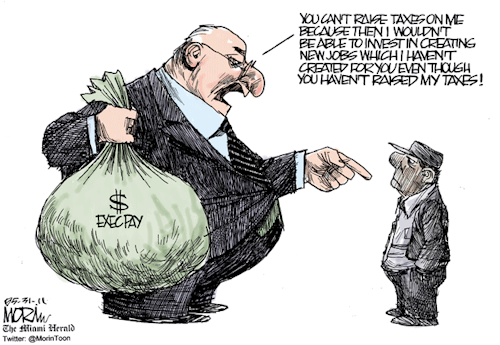






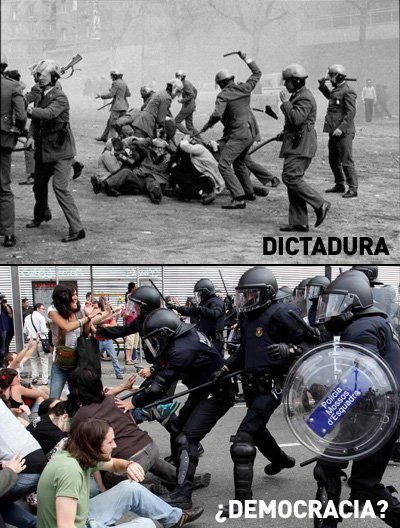

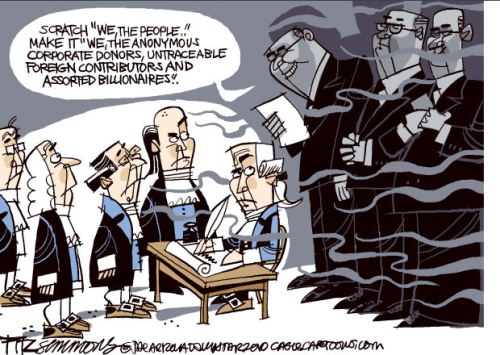

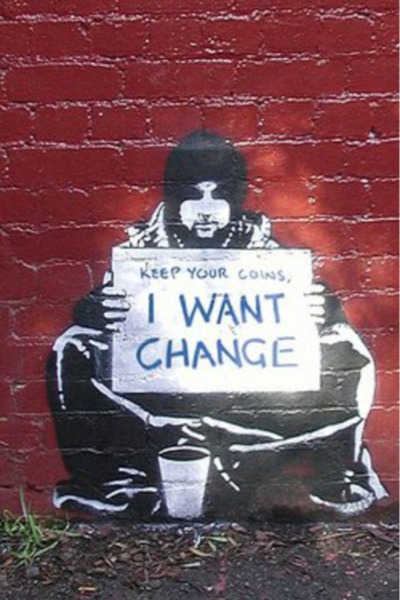
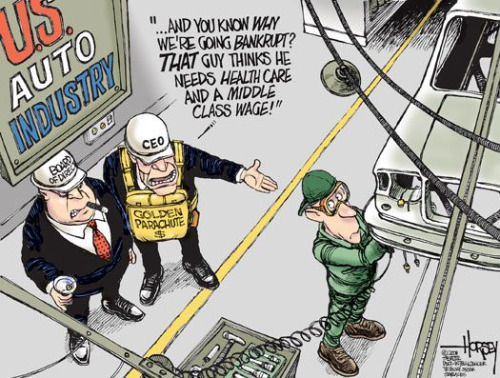

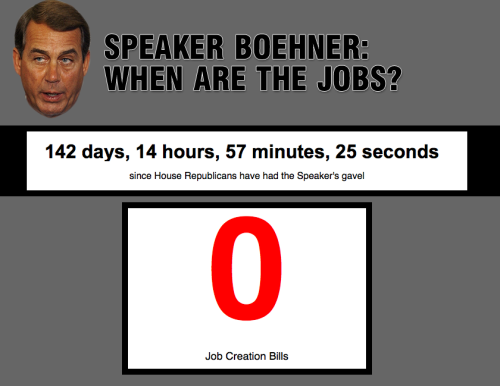



 Kurt Cobain onstage at the Pukkelpop Festival in Belgium, 1991
Kurt Cobain onstage at the Pukkelpop Festival in Belgium, 1991
